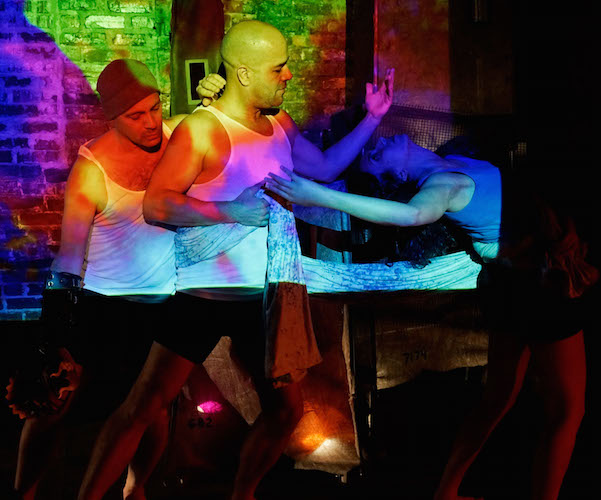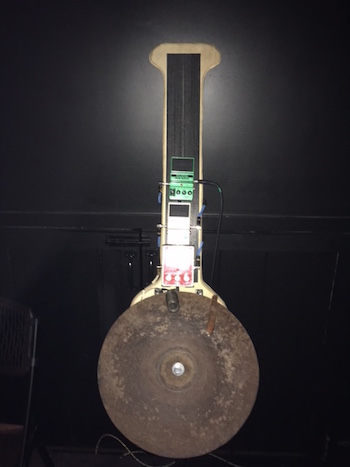Theater Review: “Dhalgren Sunrise” — Unreal City
This is an evening that, through an excess of imagination, makes as little sense as possible.
Dhalgren Sunrise, based on the novel Dhalgren by Samuel R. Delany. Adapted by Mitchel K. Ahern and Vanessa LeFevre. Staged by Fort Point Theatre Channel at the Chelsea Theatre Works, 189 Winnisimmet Street, Chelsea, MA, through June 24.

A scene from the Fort Point Theatre Channel production of “Dhalgren Sunrise.” Photo: Melissa Shook.
By Bill Marx
I read Samuel R. Delany’s 800-page novel Dhalgren when it was published in 1975. I was excited by the book, but it left me bewildered, and I was far from alone. The convoluted narrative was loved and hated by prominent members of the science fiction community. Some saw the volume as the moment that alternative fiction grew up; the author drew on a panoply of Joycean/Modernist techniques to create a logic-defying world that was alien from ours. Inexplicably, the city of Dhalgren had wandered off into a post-apocalyptic /space-time riff that radically mutated perception and language, the latter taking the form of a deliciously Beat-en to a pulp stream-of-consciousness. Others saw the volume as Dada dead-on-arrival, an overgrown mix of myth and mayhem. I must admit that other novels Delany wrote in that the period (1968’s Babel-17 in particular) meant more to me, but there is no gainsaying that Dhalgren is an exhilarating (if exhaustive) expression of the irrational, boundary-breaking energies (sexual, psychological, drug-induced, political) of the revolutionary sixties. What’s more, its grimly dystopian vision (a city is perpetually on fire) takes on new significance with Climate Change.
(Delany, African-American and gay, is still writing at the age of 75. According to an informative 2015 New Yorker interview, his 2012 novel Through the Valley of the Nest of Spiders, “traces the lives of two young gay men from 2007 into the future. It features coprophagia, bestiality, and the erotic sharing of snot.”)
Given my admiration for the writer, I had to take in Fort Point Channel’s Dhalgren Sunrise, and I am very glad I did, though, understandably, you only get slivers of the epic novel in the hour-long piece, which features readings (sometimes rough around the edges) of snippets from the book packaged in what FPTC calls “an act of collaborative literary criticism through invented musics, improvisational dance, interactive video, architectural puppetry and stagecraft.” Not all of these elements succeed, but so what? It is enjoyable watching the company try something different, particularly at a time when theater is becoming increasingly TV-ized, its dramas childishly linear, festooned with easy listening scores. This is an evening that, through an excess of imagination, makes as little sense as possible.

One of Fort Point Theatre Channel’s invented instruments for its production of “Dhalgren Sunrise.” Photo: Bill Marx.
The FPTC program gives each short segment from Dhalgren a title and an explanatory note. For example: “Scorpions — Violent street gangs turn themselves into giant video insects with a flick of a switch.” Now if the company had pulled that description off it would have really been something. What we get is a group of dancers undulating about the floor with images of oversized scorpions and bursts of fire flickering on the brick wall behind them. Strings of blinking colored lights are wound around their bodies. This is definitely funky (sixties style), but what’s missing here (besides the Hollywood special effects) is a sense of threat: no matter how long they snap about the scorpions are not all that scary.
This static quality afflicts the other segments as well. The dancers are earnest, at times powerful, and the visuals intriguing and generally eye-filling. Love those explosions of tie dye colors! (Though the visuals could be more ‘interactive” with the performers). The problem is that there is a lack of dramatic propulsion and variety. The dancing episodes come off as attempts to ‘illustrate’ the words read from Dhalgren rather than as an exercise in “literary criticism.” The omni-genital gratification orgy scene (“Sex — Gender roles and desires are fluid and chaotic”) is pretty amusing, if a touch cheesy — a trio of dancers climb into a giant body stocking and undulate about. Of course, turn-ons are in the eye of the beholder — for some this might be a titillating pansexual fantasy. But it didn’t do much for me.
The dark puppet towers are visually impressive, but they are underutilized. They sway about alluringly on occasion, but too much of the time they sit like boxes in the background. Where this production nails the mind-bending spirit of Dhalgren is its marvelous improvisational soundscape, a fabulous accumulation of creaks, blats, bloops, and scratches (and, what sounded to my ears, to be the blast of a shofar) created by various invented instruments (by Mitchel K. Ahern, Vanessa LeFevre, and others). Here is something enticingly different for the ear and the eye. Not only is the dreamlike dirge of a score a treat, but the instruments, arranged around the space, are great to look at — it is as if we are in a show room of alien paraphernalia, an extraterrestrial band. When the musicians are in full throttle, Dhalgren Sunrise triumphantly enters the precincts of Delany’s unreal city.
Bill Marx is the editor-in-chief of The Arts Fuse. For over three decades, he has written about arts and culture for print, broadcast, and online. He has regularly reviewed theater for National Public Radio Station WBUR and The Boston Globe. He created and edited WBUR Online Arts, a cultural webzine that in 2004 won an Online Journalism Award for Specialty Journalism. In 2007 he created The Arts Fuse, an online magazine dedicated to covering arts and culture in Boston and throughout New England.

I wanted to thank you for reviewing Dhalgren Sunrise. I thought it quite positive, and the critiques on point.
I think you came on Friday, opening night. We were all pleased that we didn’t screw anything up, but came away thinking we needed to amp it up for subsequent performances, which I think we did.
Anyhow, the show sold out Saturday/closing night, and I was certainly happy to have been able to cross the bridge into Bellona.
Thanks again,